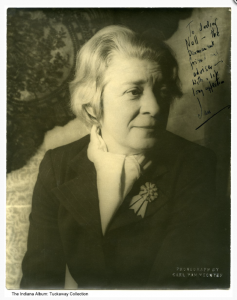(Mar. 13, 1892-Nov 7,1978). Janet Flanner was the second child of Mary Hockett Flanner and . The parents were active in the business, civic, and cultural life of Indianapolis: Mary as a poet, playwright, actress, and platform reader, Frank as a founder and partner of and a benefactor of the settlement house that bore his name (See ).
Flanner’s education started in the public schools, but at age 11 she transferred to Tudor Hall where she was undistinguished academically but a popular member of the class of 1909. After high school, Flanner joined her family in a year-long visit to Germany. Soon after the family returned to Indianapolis, Frank Flanner committed suicide.
After less than two years at the University of Chicago and a brief stint in Philadelphia working at a girls’ reformatory, Flanner returned to Indianapolis and was hired by Frank Tarkington Baker, the drama editor of the , to review vaudeville and burlesque shows. That job soon led to a promotion to assistant drama editor and a column, Impressions in the Field of Art. During some of this period, Flanner used the name “Jeannette.”
In April 1918, Flanner married and immediately left for New York, but she was back in Indianapolis a month later writing Comments on the Screen for the . Within months, Flanner was back in New York and never returned to Indianapolis except for brief visits.
In New York, Flanner was on the edges of artistic and literary groups and earned some distinction as a wit. However, it was not until she moved to Paris (1922) and accepted an assignment for (1925) that she began to find her niche in American literature. Her marriage ended during this period.
Harold Ross, the editor of , asked Flanner to write a semi-monthly Letter from Paris in which Flanner would describe what the French thought was happening. Since Flanner was part of the “Lost Generation” group of authors who gathered in Paris’ Left Bank literary colony and the Parisian artistic scene, she was a natural for this assignment. For the next 50 years, often using the pseudonym “Genêt,” Flanner wrote “Letters,” “Profiles,” and “Reporter at Large” pieces for The New Yorker.
Her writing style was lean but descriptive, and personal comments were omitted. During World War II, Flanner spent some time in New York, but she returned to Europe with the U.S. Army in 1944. She remained in Paris until her retirement in 1975 when she moved to New York.
Flanner wrote one novel, , published in 1926. Other books by Flanner were (1940); (1944); (1957); (1965; winner of the National Book Award for Arts and Letters in 1966); (1971); (1972); (1975); and (1979).
Flanner was honored by the Indiana Arts Commission in 1975. She received an honorary Doctor of Literature degree from Smith College and was awarded the French Legion of Honor.

Help improve this entry
Contribute information, offer corrections, suggest images.
You can also recommend new entries related to this topic.





